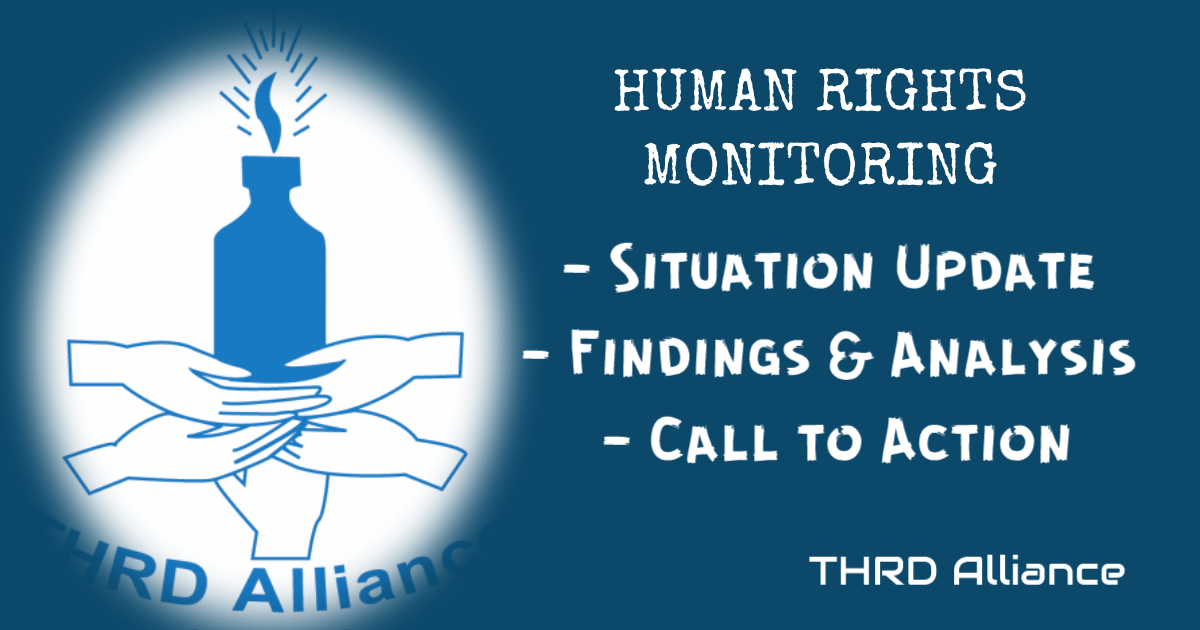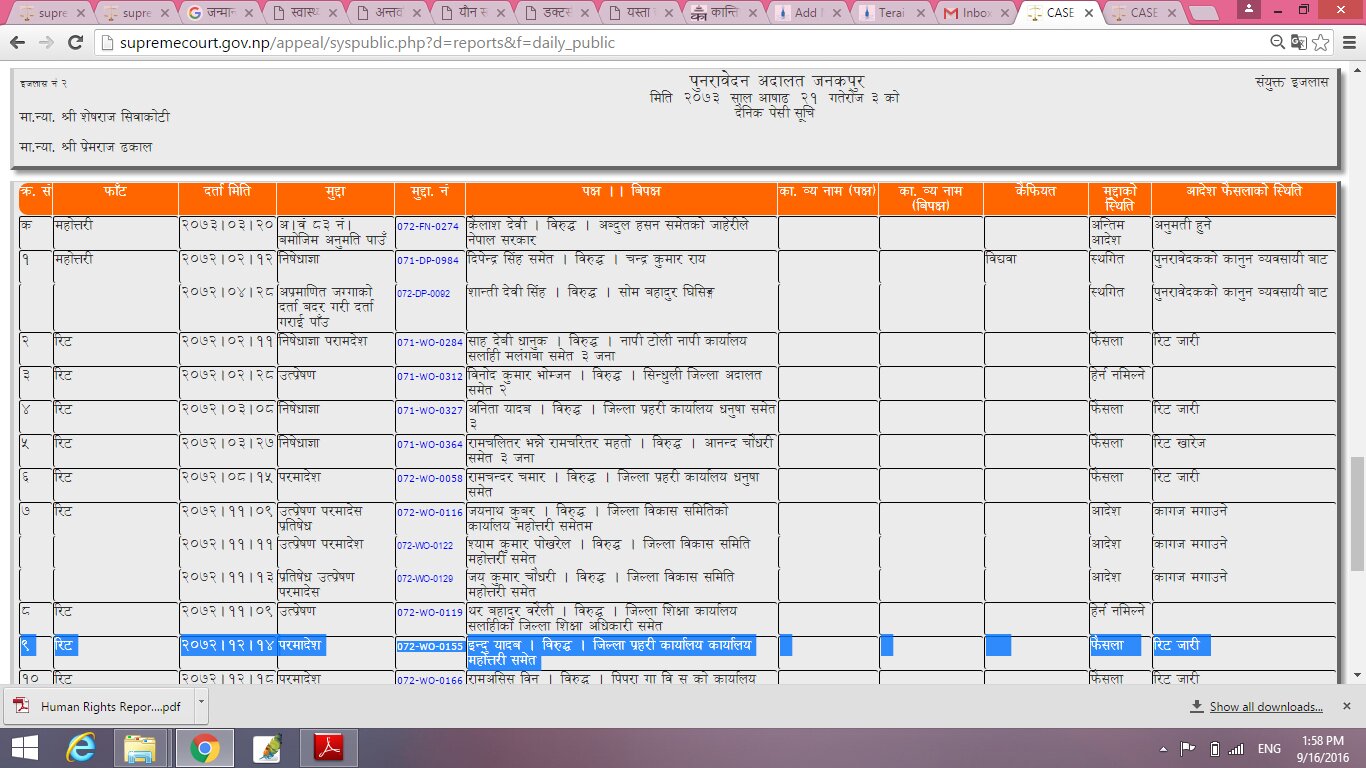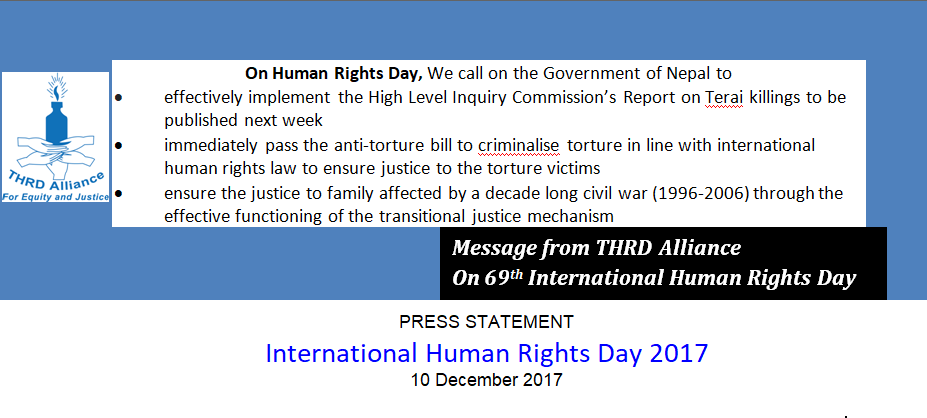Over the past six months, police unlawfully killed four persons (one affiliated to alleged armed outfit; two affiliated with Netra Bikram Chand ‘Biplab’-led communist party; one death caused by excessive use of force) in Nepal. Dipendra Chaudhary was killed in police firing in Saptari district on 23 January 2019. Police claimed that they reacted with firing of bullet on Chaudhary after he opened fire at the police. However, our monitoring found that there are grounds to suspect the case of unlawful death of Chaudhary. Likewise, police shot dead two members of the Biplab group – Tirtha Raj Ghimire in Bhojpur district on May 22 and Kumar Paudel in Sarlahi district on June 20. Yet again, Saroj Narayan Singh was killed due to excessive use of force by police in Sarlahi while residents of Ishwarpur in Sarlahi were protesting the death of a 12-year-child on the East-West Highway. The child fell into a 30-foot sand pit in the Banke river (which has been formed illegally due to illegal and sand minding) and died. Besides, a record maintained by Nepal police shows the arrest of more than 580 leaders and cadres affiliated with the Biplab-led group.
The monitoring of human rights by various organizations, including National Human Rights Commission (NHRC), Advocacy Forum and Terai Human Rights Defenders Alliance (THRD Alliance) shows an ongoing pattern of extrajudicial killings, torture, arbitrary arrest and other human rights violations. The killing of Ghimire in Bhojpur and Paudel in Sarlahi within a month and the arrest of hundreds of the Biplab group members took place within a month after a cabinet decision on March 12 labelled the Netra Bikram Chand-led communist party a “criminal group” and banned its activities.
Referring to such a pattern, NHRC Chairperson Anup Raj Sharma on 22 June 2019 stated:
Now there has been an increased tendency to indulge in encounter when police arrest an accused person, but they fail to collect adequate evidence to secure conviction of the accused.
Such incidents, in what appears to be a ‘crackdown’, are a blatant violation of both domestic and international human rights laws. Hence, a credible and fair investigation into the alleged extrajudicial killings, including the one covered by this update, is a must.
Sarlahi Incident in Brief and Monitoring
Kumar Paudel, identified as Sarlahi district in-charge of the Biplab-led Communist Party, was shot dead on 20 June 2019. According to police, they opened fired in response to shots fired by a group of four persons on two motorcycles, who were heading towards Sindhuli via a forest in Lalbandi.
Following the incident, a THRD Alliance monitor visited the incident site, interviewed local people living near the site, police officials, including Superintendent of Police and Deputy Superintendent of Police, and interviewed the family members of Kumar Paudel. Likewise, two teams from both provincial and central offices of NHRC visited Sarlahi and started the investigation.
Place of incident
Lalbandi-1 Chandranagar Forest, which is three kilometers to the north of Nawalpur Chowk on the East-West Highway in Sarlahi district.
According to police, the following things were recovered from Kumar Paudel’s bag: Three feet-long dead wire that can be used for detonating explosive materials, five feet-long wire, one revolver and four bullets for the revolver, one handmade pistol and two bullets for the pistol, 200 pieces of blank identity card with the word ’Bhumihin Sukumbasi Sangh’ (landless people’s association) printed on them and one new bike, bearing the number – Na 22 Pa 64.
Scene at the incident site
The crime scene is in the forest, which is close to Chandrapur village. Road near the crime scene goes to Sindhuli. Blood was seen at the crime scene in which the police had covered with soil. Locals said they did not hear any gunshot on that day. During the daytime, locals were prevented by plainclothes police from entering the forest. Cowherds were also prevented by 4-5 plain clothes police from entering the nearby forest.
Physical condition of deceased Kumar Paudel
Paudel was hit with a bullet in his hand and head. His hand appeared to have fractured. The victim does not have gunshot wounds in other parts of the body and in real encounters; those killed often have gunshot wounds in other parts of the body as well. Journalists who reached the crime scene while the body was taken from there informed THRD Alliance monitor that the part of the victim’s head, which was hit with the bullet faced the ground. It was visible in the photographs taken by media persons. Knowledgeable persons say that this is inconsistent with the conditions of real encounters. Police allowed media professionals to take pictures of the victim’s body only from one side.
Condition of the deceased’s family
The victim is survived by his wife, one 14-year-old son and one 10-year-old son.
According to locals and family members:
Poudel was a social activist and former national practitioner of martial art. He was previously associated with Nepali Congress; Chure Bhawar Party before joining the Netra Bikram Chand led party. The government wanted to vacate 11,000 bigha of land occupied by landless people in Sarlahi district but could not do so due to resistance from Paudel and others. Paudel had survived police firing in the past when clashes had taken place between the police and landless people.
Paudel’s nephew Kushal and locals, who received Paudel’s body on 22 June have demanded judicial probe into the incident. They also demanded that Poudel be declared a martyr and compensation be paid to his family. Paudel’s brother Krishna and his family received his body after Sarlahi’s Superintendent of Police pledged before NHRC representatives that he would take the initiative to meet the family’s demands. The family of the deceased demanded that the word ‘Paudel was killed in an encounter’ should be removed from the legal documents following which the police replaced the word ‘encounter’ with ‘police action.’
The family members, who THRDA staff met during monitoring, complained that Paudel was shot dead deliberately. The victim’s body decomposed because the administration did not put the body in the ice-box even after 48 hours. Intestines of the victim came out as the stitching was not done properly during the autopsy. The family members were allowed to see the body only after postmortem was done. Family of the victims complained to human rights activists and media professionals that the administration did not keep the victim’s body in a dignified way.
Conclusion: Investigate and bring those responsible to justice
NHRC is currently investigating the three incidents of alleged extrajudicial killings. NHRC’s Janakpur bureau is investigating Chaudhary’s killing while its Biratnagar bureau is investigating the incident in Bhojpur. NHRC’s central office in Kathmandu is probing Kumar Paudel’s death. In all these cases, police claimed that Paudel was killed in retaliation. Although there were no eyewitnesses to these incidents, there are sufficient grounds and possible motives to suspect the alleged EJK. In such cases, circumstantial evidence points to extrajudicial killing of these persons. Unlike three cases, the fourth case is related to the excessive use of force by law enforcement agencies. This also contributes to the ongoing pattern of excessive use of force and killing during protest in Terai. In 2015/16, THRD Alliance documented 37 cases of similar nature. A fair and swift investigation into the unlawful killing by police is a must, and those responsible should be brought to justice.
In addition, the arrest of the Biplab-led party cadres has become rampant lately. As per the information provided by Nepal Police as of May and published in The Record, more than 580 leaders and cadres affiliated with the Biplab-led communist outfit has been arrested. Among those arrested, 135 were released after interrogation, while 338 were asked to appear in court. The record shows that most of them were released on bail.
Against this situation and keeping in mind the government’s ongoing crackdown on the Biplab group’s activities, the NHRC formed a rapid response and action team to monitor human rights situation on 29 June 2019. These incidents resemble those taking place during the decade-long Maoist insurgency and protests in the Terai. Political analysts and human rights activists/experts are of the view that the government has mistaken in its decision to ban the Biplab-led party and to go for a crackdown approach. Suppression of the political party with a different ideology cannot be the solution. The Biplab group should stop the activities such as extortion and explosion of improvised devices. Both the government and the Biplab group should choose dialogue to solve the issues.





